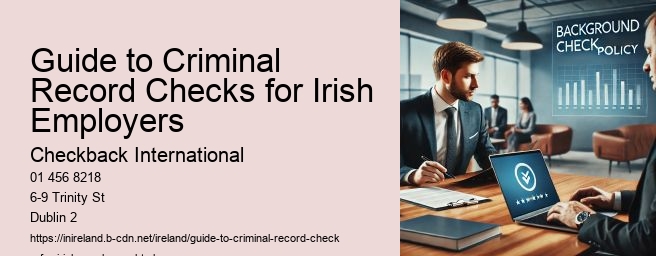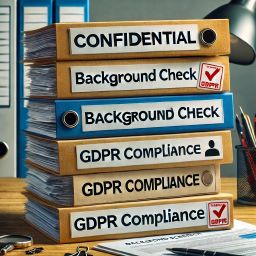

Common mistakes in the vetting process include wrong information provided, missing or incomplete disclosures, and problems with confirming details through independent sources.
A candidate who fails to meet PSA standards during the vetting process may not qualify for the position. Each organization's rules and policies determine what happens next and what options are available.
Vetting results stay valid for 12-24 months after completion, though timeframes may differ across industries and regulatory requirements.
Most pre-employment vetting services in Ireland complete background checks within 24-48 hours for standard requests, with European criminal record checks taking 5-10 working days.
Remote work background checks also review a candidate's experience with remote technology and data protection practices.
Social media checks during pre-employment screening must follow specific legal requirements.
Conclusion
3.Data retention periods must be specified, with personal information deleted after it is no longer needed for the screening purpose.
The General Data Protection Regulation (GDPR) affects the storage of background check data by requiring strict data protection and privacy measures.
Data Retention Policies
This monitoring supports reliability in the security industry and builds public confidence.
The process lets applicants and companies move forward with cross-border hiring without long delays in recruitment. For time-sensitive needs, faster processing options exist, which helps organizations meet hiring deadlines.
2.Employment History Verification: Examines candidate work history to confirm accuracy.


This broad employment screening helps Irish businesses meet security standards and regulatory requirements while making informed recruitment choices.
Clients often report the quick completion times and professional work of vetting services, comparing them favorably to previous in-house screening methods.
Pre-employment vetting in Ireland functions as a core business process combining compliance requirements with risk management. Company Directors Check Through screening protocols, including ECRCs, credit checks, and specialized security verifications, organizations maintain high standards during recruitment. The use of processing systems and compliance with data protection laws allows Irish employers to evaluate candidates while meeting legal requirements.
Private investigators and locksmiths may need extra security clearances to meet PSA licensing standards.
The application process for the European Criminal Record Check (ECRC) follows multiple steps for European recruitment standards.
Candidates can review the information collected and dispute any inaccuracies through designated procedures.

While processing times control the operational aspects of background checks, strict data protection protocols protect all personal information throughout the vetting process in Ireland.
Can International Candidates Be Vetted for PSA Compliance?
Turnaround Times and Service Efficiency

A background check in Ireland involves reviewing a person's criminal, financial, or personal records to assess their suitability for a role or position.
The duration can vary but typically takes between 1-2 weeks, depending on the type and complexity of the check.
Garda vetting is a specific type of background check required in Ireland for individuals working with children or vulnerable adults, involving checks against police records.
Yes, you must obtain consent from the individual before conducting any background checks in Ireland.
Not for all employees, but certain sectors such as healthcare and education may require comprehensive checks.
It includes checking for any criminal convictions or offences recorded against the individual.
Yes, individuals can request their own background checks in Ireland for personal review or to prepare for employment screenings.
Skipping background checks can lead to hiring unsuitable candidates, which may result in legal and reputational risks.
Yes, police clearance is a general criminal record check, while Garda vetting is specific to roles involving vulnerable groups and includes more detailed investigations.
You can request transcripts or degrees directly from educational institutions or use third-party services that specialize in educational verifications.
Information about spent convictions, certain types of personal data, and other protected characteristics under GDPR is off-limits unless specifically relevant and lawful to access.
International checks may involve additional complexities such as different laws, languages, and longer processing times.
No, background checks do not affect your credit score as they do not involve a credit inquiry that would impact the score.
Best practices include securing data in compliance with GDPR, limiting access to authorized personnel, and ensuring data is stored for only as long as necessary.
It depends on the industry and role, but typically every 2-3 years or when significant changes occur in the individual’s role or responsibility.
While not specific by law, many IT positions require checks due to access to sensitive or proprietary information.
GDPR regulates the processing of personal data, ensuring that background checks are conducted in a lawful, fair, and transparent manner.
Yes, but it must be done lawfully and with the individual’s consent, considering the relevance to the role.
Penalties can include fines, legal actions, and reputational damage, depending on the severity of the non-compliance.
Remote work has increased the importance of thorough background checks, especially for those in positions of trust or handling sensitive data.
Best practices include conducting similar checks as for permanent staff, especially if they have access to sensitive or critical areas.
Ensuring fairness involves following consistent procedures, obtaining consent, and allowing candidates to dispute inaccuracies.
Yes, it’s recommended to tailor background checks based on the specific risks and requirements of each position.
Signs include transparency about services, compliance with legal standards, positive reviews, and strong data protection practices.
Handling involves assessing the relevance to the job, discussing findings with the candidate, and considering legal and ethical implications.